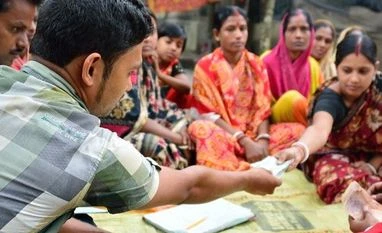The Business Correspondent Resource Council (BCRC) is to make a case for an increase in the commission paid to agents with the Ministry of Finance, along with related issues such as the setting up of an annual pricing review committee and a re-examination of the penalties imposed by banks on business correspondents (BCs).
The BCRC is advocating for a 30 basis point increase in the commission paid by banks for cash withdrawals, cash deposits, money transfers, Aadhaar-enabled Payment System (AePS) transactions, and other banking and financial services.
Currently, the commission paid to BCs is not uniform and varies across banks. For example, in the case of cash withdrawals, the commission ranges from 0.5 per cent of the transaction amount (capped at Rs 15) to 0.4 per cent (capped at Rs 40 for amounts up to Rs 10,000).
“Cash-in, cash-out (CICO) is the earning mainstay. Though CICO transactions constitute more than 60 per cent of their income, there’s been no revision in the pricing for the last decade,” said a senior BC official.
It was pointed out that while the Department of Financial Services had formed a monitoring committee to streamline BC operations, the core issue of the channel’s viability and sustainability remains unaddressed.
Regarding penalties, banks now impose a fine of Rs 1,000 per month if agents remain inactive for two months. Additionally, if an agent is found operating another bank’s portal or mobile app, they are terminated immediately with a Rs 10,000 penalty.
The BC channel was initially designed to bring the last-mile population into the formal banking system. Over time, it has transitioned from offering basic banking services, such as account opening and transactional activities, to providing value-added products and services, including lead generation for asset products, loan collection and recovery, insurance, and investment products. The channel is also envisioned to function as a branch replica in rural areas, where all types of services can be provided.
In 2022, a sub-committee on BCs, headed by State Bank of India’s then managing director C S Setty (now the bank’s chairman), had opined that it is desirable that a broad-based bouquet of products and services is available at each outlet”. These services may be available to all outlets, irrespective of geography. The availability of extended services will also augment the income level of operators and ensure their viability in the long term.
Regarding penalties, there were none in the BC-bank agreement when the channel was launched two decades ago. While a penalty clause was incorporated later, it was never acted upon due to the channel’s low-income structure, fewer opportunities, and potential in rural areas, of centres being classified as “difficult” (as decided by banks), low connectivity; and at times, non-payment of fixed allowances by banks.
In July last year, the Business Correspondent Federation of India and Grameen Foundation India made a pitch for “concrete capacity building” within the channel. The BCRC, on its part, has proposed the creation of an India Business Correspondent Equity Fund — akin to the India Microfinance Equity Fund.
TALKING POINTS
An annual pricing review committee on the commissions paid to business correspondents
Business correspondents seek 30 basis points rise in commission for cash withdrawals, cash deposits, money transfers, AePS transactions, and other banking and financial business
The removal of penalties in the BC scheme
Issues raised by the report of the sub-committee on BCs in 2022
Unlock 30+ premium stories daily hand-picked by our editors, across devices on browser and app.
Pick your 5 favourite companies, get a daily email with all news updates on them.
Full access to our intuitive epaper - clip, save, share articles from any device; newspaper archives from 2006.
Preferential invites to Business Standard events.
Curated newsletters on markets, personal finance, policy & politics, start-ups, technology, and more.
)